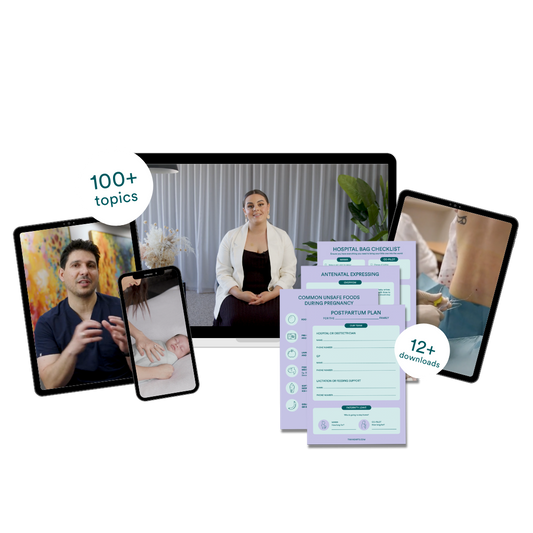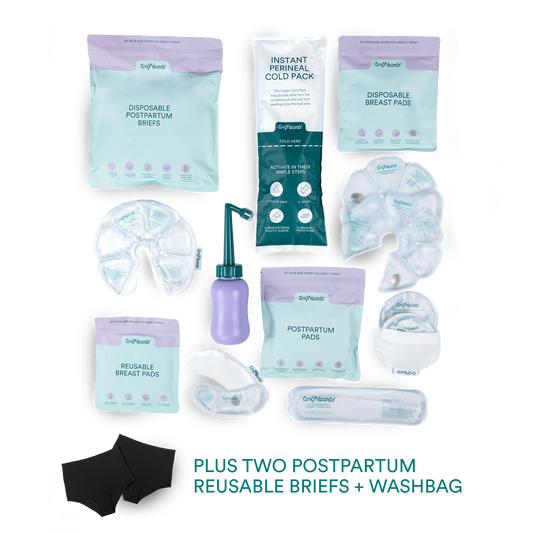Please don't kiss my baby.
- It's not because we're overreacting. It's not because we're 'taking it too far'. It's not because we don't want them to be loved on by our friends + family.
- It's because Herpes Simplex Virus - HSV [The Coldsore virus] is life-threatening to babies.
- It's because newborns' immune systems aren't fully developed.
- It's because what seems like something so insignificant to an adult can be life-threatening to a little one.
- It's because an adult who carries HSV can spread it, even without symptoms or an active cold sore.
- It's because bubs are little + struggle to fight big germs.
- It's because they're too precious to risk it.
Type 1 + Type 2
There are two types of Herpes simplex virus [HSV].
Type 1 is the virus responsible for cold sores + blisters in the mouth, eyes, lips and on the skin. It's highly contagious + is usually spread from mouth to mouth + skin to skin contact from people who are infected with the virus [even if they have no symptoms or cold sores present at the time], or contact with an infected object. That's because adults may be actively shedding the virus without realising it, meaning their saliva will contain the virus + can spread because once you're infected with HSV, you carry it for life.
Type 2 is an STI that causes genital herpes. If lesions are present during a vaginal birth without proper preparation, such as antivirals prior to birth, there's a chance that it could be transmitted to bub during the labour and birthing journey. Both types of HSV can make little ones seriously sick and, in severe cases, can cause death.
Signs + symptoms
Symptoms can begin within 2-20 days after being exposed to the virus. In little ones, you may notice:
- Itchy, painful, irritated, burning or tingling skin
- Blisters popping up around the mouth, on the skin or around/ in the eyes, which may develop into open sores
- Lethargy
- Poor feeding
- Fever
- Respiratory distress
- Breath-holding episodes
- Seizures
When should I take my little one with cold sores to the doctor?
- If your little one is under 6 months of age and gets a cold sore
- If they're immunocompromised
- If cold sores aren't healing within two weeks
- If your kiddo also has eczema.
- If cold sores occur in conjunction with a headache/seizure or confusion. These are signs of encephalitis and need to be treated very seriously.
- If your little love is getting frequent bouts of cold sores.
- If they have any sores, break out near their eyes, or their eyes become irritated.
Treatment
If bub is under 1 month or is showing signs + symptoms, is very unwell or dehydrated, take them into the Emergency Department.
If bub is unwell, the Doctors may recommend a series of blood tests and swabs of the blisters or affected area to try and detect the Herpes Simples Virus. If bub is very young, critically unwell or showing signs that the virus may have progressed into the central nervous system [brain + spinal cord], the medical team may recommend a lumbar puncture to see if the fluid that floats around the spinal cord + goes up to the brain is infected with HSV. From there, they may also recommend beginning an antiviral medication to help treat bub for weeks, or even potentially months. If bub is having trouble breathing, they may require oxygen. If bub is showing signs of dehydration, the medical team may recommend an IV drip into the hand or a feeding tube that goes down the nose and into the belly. This also means that bub may be admitted to the hospital for a length of time.
If bub remains mostly well well + is older, you can try:
- Cold compresses can help with the pain and discomfort. Try a teething ring, a wet cloth for your little one to bite on or a cold pack like our character cool packs, to put on the outside of the mouth.
- Keep up hydration with icy-poles, cold drinks and foods. Your little one may find sipping through a straw more comfortable, and puree foods may be easier for them.
- Pain relief, such as Paracetamol and Ibuprofen can be helpful. Give as per the instructions on the bottle. Be mindful of over the counter meds that contain local anaesthetics.
- Pharmacies may recommend these, but the ingredient Lidocaine can be harmful if too much is swallowed.
- The doctor may consider starting bub on some antivirals but the best person to get more info on this from is your GP.

My Nahla was two when she contracted the virus from daycare. She became extremely unwell with raging fevers over 40 degrees and inconsolable irritability from the immense pain in her mouth. By the second day, ulcerated blisters had broken out on her tongue and gums. Eating and drinking were unbearable for her, which added worry about her risk of dehydration.
It was the worst, and she was 2 years old. I cant imagine how sick she would have been if she was only a little bub. Many children with cold sores will drool excessively, be unusually irritable and have a sore throat or swollen glands around their neck. Experts say that one in four kiddies will get mouth ulcers after their first viral infection, and the virus can stick around for up to two weeks. In most cases, though, the symptoms will go away on their own.
How serious is it?
Serious infections of HSV is uncommon, but make no mistake, the Herpes Simplex Virus can be life-threatening to babies. The risk is that it can lead to encephalitis [inflammation of the brain] and may infect multiple parts of the body at one time, potentially causing symptoms involving the central nervous system [brain + spinal cord], such as seizures. Older kiddos who are infected can also experience significant sickness, pain + dehydration from this virus. While medical care has come a long way, even with the best treatment, some newborns can pass away or experience significant long-term effects, including brain damage from a HSV infection.
And if you think it doesn't happen, let's turn to the data. In 2015 in Australia, there were 19 confirmed cases of HSV in little ones under 1. 16 of those 19 cases were in bubs under 1 month, and 3 were aged between 1 month and 1 year. Of those, 11 had HSV-1 and had been contracted after birth through contact or exposure to the virus from someone who was carrying or shedding the virus.
One bub developed encephalitis from HSV, one bub developed central nervous system symptoms from the HSV infection and three newborns passed away. 💔
Another study conducted in 2014 focusing on HSV in Australia confirmed that if the HSV infection spreads or involves the central nervous system [brain + spinal cord], death or severe disability is almost certain without treatment. It also suggested that in Australia, HSV-1 is the most common cause of HSV infection in newborns and that the HSV-1 rate had increased over time, with the age group of parents most affected of increased rates of HSV-1 being young mamas. Thankfully though, treatment for babies is also proving to be very effective.
At what age do cold sores become less of a danger for little ones?
There is no definitive answer of an age that rules out the risk altogether. This is because we are all born with and develop varying levels of immunity, some of us more compromised than others. What's most important to remember is the vulnerability of our littlest loves, and this is our bubs under the age of 6 months and those already immunocompromised or challenged by prematurity.
"We used to kiss babies all the time + they were fine!"
Comments like this are known as 'survivorship bias'.
This bias focuses on the fact that you survived something whilst overlooking other important factors and can falsely lead us to think things are safe when the data says otherwise. The truth is there are many things generations before us "survived" that are now known to be hazardous. There are also many who haven't survived and are not around to tell their story. To put it simply, 'when we know better, we do better'.
The other thing to consider is that it's not just HSV that can harm babies by kissing them. RSV; Rhinovirus; Adenovirus; Whooping Cough; Hand, Foot + Mouth; Chicken Pox; all viruses that are spread by droplet or contact. If you're infected [remembering that even serious illnesses can present with very mild symptoms in healthy adults], and you kiss a little one on the mouth or hands, you've delivered those germs straight into their body, and their likelihood of becoming unwell is much greater.
But can I still kiss my own baby?
We're not going to tell you not to kiss your baby because we know that showing little ones affection through cuddles + kisses is so beneficial for parents + their bubs. It stimulates Oxytocin, promotes bonding and is part of the way that we as humans show our love for each other. But we also know the consequences of bubs getting HSV-1 can be devastating. To minimise your risk, consider:
- Keeping kisses to clothed areas
- Avoiding kissing them on the mouth
- Avoiding kissing baby on the hands [keeping in mind these go straight in the mouth]
- Being so vigilant when you feel a cold sore coming on
- When you do have a cold sore, avoid sharing cups, utensils + toothbrushes
- Avoid touching their exposed skin areas such as open wounds, burns or eczema if you've got a cold sore
- Keep up the hand hygiene
Is it still safe to breastfeed if I have a cold sore myself?
Mums with cold sores may transmit HSV to their bubs by contact with the lesions, so it's important you get timely treatment to nip your infection in the bud! Most anti-viral treatments mums are given are safe whilst breastfeeding but check with a doctor. So long as breasts remain free of infection, breastfeeding is still to be encouraged. Being diligent with your hand hygiene is a top priority and avoiding sharing spoons with bubs if they are onto solids is an absolute must.

What about antibodies?
We can never be sure exactly how much the body has built up immunity from exposure to others, so for this reason, it's best to play it safe. That being said though, an interesting study in the US found that pregnant women who'd previously had the herpes simplex virus DID maintain active antibodies that COULD protect against neurological infections from HSV in their bubs. Although I'd love to say this news means we can all breathe a sigh of relief it's important we don't take it as gospel.
Little people are so precious, and as family + friends who love these little ones, there are lots of things you can do to show them love, while keeping them safe. Society is changing. It's no longer acceptable to kiss someone else's baby. So from a place of love + concern for the health and wellbeing of littles; please, don't kiss them.
If you've got a newborn and are unlucky enough to have a cold sore, this blog will help you keep them safe.
Helping you feel prepared for parenthood is what Tiny Hearts is all about. Book into our baby and child first aid class, and let us empower you to face parenthood without fear.








